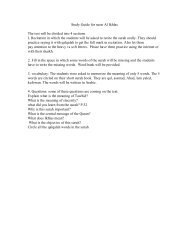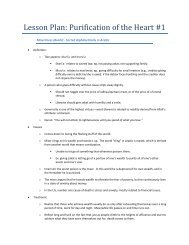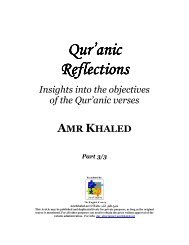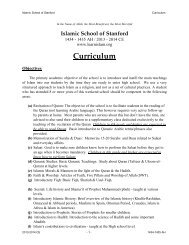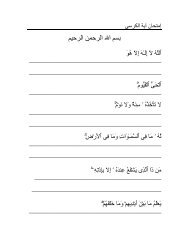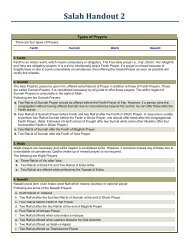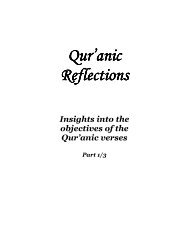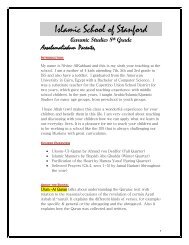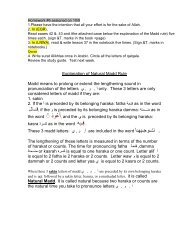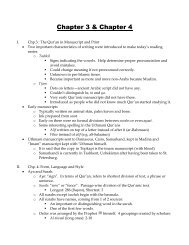Quranic Reflections - Islamic School of Stanford
Quranic Reflections - Islamic School of Stanford
Quranic Reflections - Islamic School of Stanford
You also want an ePaper? Increase the reach of your titles
YUMPU automatically turns print PDFs into web optimized ePapers that Google loves.
messengers to their people; namely Nuh (Noah) and Musa (Moses) (AS). In this<br />
respect, Allah (SWT) says what can be translated as, “And recite to them the tiding<br />
(Literally: information) <strong>of</strong> Nûh (Noah) as he said to his people, “O my people, in<br />
case my station (here) is greatly (annoying) to you, and my constant reminding<br />
you <strong>of</strong> the signs <strong>of</strong> Allah, then on Allah I have put my trust”…” (TMQ, 10:71).<br />
Allah (SWT) says about Musa (AS), what can be translated as, “And Mûsa said, “O<br />
my people, in case you have believed in Allah, then in Him put yourtrust, in case<br />
you are Muslims.” (i.e., you have surrendered to Allah) Then they said, “On<br />
Allah we have put our trust. Our Lord, do not make us a temptation to the<br />
unjust people.” (TMQ, 10:84-85).<br />
The Pharaoh and The people <strong>of</strong> Yunus (AS) (Jonah)<br />
Towards the end <strong>of</strong> the surah, two stories are used to clarify what has been mentioned,<br />
the story <strong>of</strong> Pharaoh and that <strong>of</strong> the people <strong>of</strong> Yunus (AS) (Jonah). After the wisdom<br />
and impeccable arrangement <strong>of</strong> Allah (SWT) are fully demonstrated, two examples are<br />
provided. The first example is <strong>of</strong> Pharaoh, who denied Allah’s miracles and<br />
warnings. The second is <strong>of</strong> the people <strong>of</strong> Yunus (AS) “Jonah”, who denied the<br />
existence <strong>of</strong> Allah (SWT) at the beginning.<br />
In the two examples, both Prophets, Musa and Yunus (AS), went to the sea, leaving<br />
behind their peoples who disbelieved in Allah’s messengers, until they were<br />
tormented. What actually happened is that while the people <strong>of</strong> Yunus (AS) were<br />
saved, the people <strong>of</strong> the Pharaoh were drowned. Allah (SWT) says what can be<br />
translated as, “And We made the Seeds (Or: sons) <strong>of</strong> Israel) pass over the sea;<br />
then Firaawn and his hosts followed them up inequitably and aggressivelytill,<br />
when the drowning overtook him, he said, “I believe that there is no god except<br />
He in Whom the Seeds <strong>of</strong> believe, and I am one <strong>of</strong> the Muslims”” (TMQ, 10:90).<br />
Here, when he claims to be a believer, the answer to this claim can be translated as,<br />
“Do you (believe) now And before (that) you readily disobeyed, and you were<br />
(one) <strong>of</strong> the corruptors.” (TMQ, 10:91).<br />
The story <strong>of</strong> the people <strong>of</strong> Yunus (AS) is similar to that <strong>of</strong> Pharaoh. The only<br />
difference is that they were saved at the end, as Allah (SWT) says what can be<br />
translated as, “So, was there a town that believed (and) so its belief pr<strong>of</strong>ited it,<br />
except the people <strong>of</strong> Yûnus As soon as they believed, We lifted <strong>of</strong>f from them<br />
the torment <strong>of</strong> disgrace in the present life, (Literally: the lowly life, i.e., the life <strong>of</strong><br />
this world) and We gave them enjoyment for a while.” (TMQ, 10:98).<br />
Allah’s torment had been inflicted upon them but their subsequent faith saved them<br />
from that affliction. What is the difference between Pharaoh and the people <strong>of</strong> Yunus<br />
(AS) Both <strong>of</strong> them declared by the end that they believed. Moreover, the<br />
messengers <strong>of</strong> both left them when they initially refused to believe. Why, then, did<br />
Allah (SWT) destroy Pharaoh and rescue the people <strong>of</strong> Yunus Can Allah (SWT) be<br />
unjust or even biased towards the people <strong>of</strong> Yunus It is indeed a wonderful example<br />
<strong>of</strong> how fate and destiny take place.<br />
“Will He not know, (He) Who created” (TMQ, 67:14)



